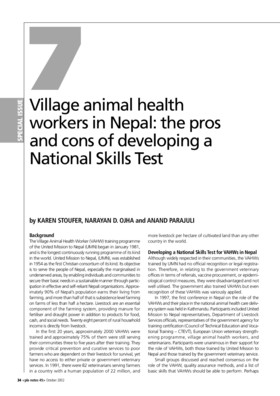Village animal health workers in Nepal: the pros and cons of developing a National Skills Test (PLA 45)

After over 20 years of training Village Animal Workers in Nepal, the programme and the people that had been trained by it remained largely unrecognised by the government. This paper looks at an attempt to help gain respect for the programme by developing a standardised examination of trainees, and the pros and cons associated with this.
This article was published in PLA 45: Community-based animal healthcare. This special issue looks at community-based animal health workers (CAHW) and the important role they have played, and could play in the future, in maintaining and improving livestock health in rural areas. Drawing on the experiences of various grassroots programmes across Africa and Asia, this collection of papers address many of the factors that hinder the use of CAHWs, like the lack of recognition within governments and problems with complex disease management, while also detailing the many advantages, like unparalleled access to communities and short training periods in comparison to formally trained veterinary doctors.
Participatory Learning and Action (PLA, formerly PLA Notes) is the world's leading series on participatory learning and action approaches and methods. PLA publishes articles on participation aimed at practitioners, researchers, academics and activists. All articles are peer-reviewed by an international editorial board. See: www.planotes.org.
To download individual articles for ‘PLA Notes 45: Community-based animal healthcare’ see 'More information' link below.
Cite this publication
Available at https://www.iied.org/g02020